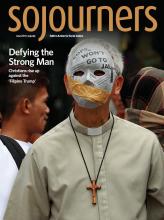IN MARCH, Speaker of the House Paul Ryan shared his excitement about block grants. “We are de-federalizing an entitlement, block granting it back to the states, and capping its growth rate,” Ryan said. “That’s never been done before!”
Ryan’s enthusiasm should be alarming, not exciting, for Christians. The block grant model is a dangerously ineffective way to protect people when they are economically vulnerable.
What’s a block grant and what’s it good for? A block grant is a fixed amount of unrestricted funding made by the federal government to a state. Traditionally, block grants have been used for law enforcement, school systems, and public transportation, allowing states more flexibility in administering programs as well as the ability to experiment.
Generally, block grants have not been used for entitlement programs, which include Social Security, Medicaid, Medicare, the Supplemental Nutrition Assistance Program (formerly known as food stamps), and Supplemental Security Income, among other programs. Why? Because doing so cuts gaping holes into the safety net that these programs offer those who are struggling, and because “experimenting” with people when they are sick, poor, disabled, or elderly is abhorrent. Scripture is unequivocal on this: We are to honor our elders and care for the poor, widows, orphans, and strangers—the most vulnerable among us.
Read the Full Article

